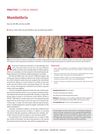 August 1998 in “Dermatologic Surgery”
August 1998 in “Dermatologic Surgery” Follicular unit hair transplantation is better than Miniflap Hair Restoration due to less scarring and more natural results.
 15 citations,
October 2003 in “Dermatologic Surgery”
15 citations,
October 2003 in “Dermatologic Surgery” Minoxidil, finasteride, and hair transplantation combined give best results for hair loss.
 13 citations,
March 2011 in “British Journal of Dermatology”
13 citations,
March 2011 in “British Journal of Dermatology” A woman with scalp lymphoma and hair loss improved with radiotherapy, highlighting the need for biopsies in similar cases.
 1 citations,
May 2017 in “Maturitas”
1 citations,
May 2017 in “Maturitas” The document concludes that managing health issues like menopause, cardiovascular risk, and hair loss is crucial for promoting longevity in aging women.
 January 2021 in “Reactions Weekly”
January 2021 in “Reactions Weekly” Finasteride might cause rare blood clot in brain for baldness patients.
 51 citations,
July 2008 in “Dermatologic Therapy”
51 citations,
July 2008 in “Dermatologic Therapy” The document concludes that surgery is a preferred treatment for cicatricial alopecia, with the method chosen based on individual factors and may require multiple sessions and careful postoperative care.
 36 citations,
May 2004 in “The journal of small animal practice/Journal of small animal practice”
36 citations,
May 2004 in “The journal of small animal practice/Journal of small animal practice” Combining cyclosporine A and ketoconazole can effectively treat anal furunculosis in dogs, with some experiencing recurrences and mild side effects.
 14 citations,
September 1991 in “Journal of Investigative Dermatology”
14 citations,
September 1991 in “Journal of Investigative Dermatology” Minoxidil slows down keratinocyte growth without being toxic.
 4 citations,
January 2010 in “Acta dermato-venereologica”
4 citations,
January 2010 in “Acta dermato-venereologica” Low androgen levels can still cause female pattern hair loss.
 3 citations,
March 2015 in “Journal of the European Academy of Dermatology and Venereology”
3 citations,
March 2015 in “Journal of the European Academy of Dermatology and Venereology” Some people with primary cicatricial alopecia also have inflammatory bowel disease, suggesting a possible connection.
 2 citations,
November 1998 in “Journal of The European Academy of Dermatology and Venereology”
2 citations,
November 1998 in “Journal of The European Academy of Dermatology and Venereology” Prednisone reduces organ mast cell infiltration but does not alter the abnormal appearance of mast cells in systemic mastocytosis.
 1 citations,
January 2019 in “Elsevier eBooks”
1 citations,
January 2019 in “Elsevier eBooks” Neuroactive steroids may affect the risk and treatment of alcohol use disorders.
 1 citations,
July 2018 in “CMAJ. Canadian Medical Association journal”
1 citations,
July 2018 in “CMAJ. Canadian Medical Association journal” A three-year-old girl has hair loss despite treatment with selenium sulfide shampoo and anti-fungal medication.
 1 citations,
November 1983 in “The Lancet”
1 citations,
November 1983 in “The Lancet” Acute leukemias with the Philadelphia chromosome may be biphenotypic, and identifying this is important for proper treatment.
 August 2013 in “Gastroenterology”
August 2013 in “Gastroenterology” A 60-year-old man with Cronkhite-Canada syndrome improved with treatment, but the condition has a high mortality rate and a risk of colorectal cancer.
 May 2009 in “The American Journal of Dermatopathology”
May 2009 in “The American Journal of Dermatopathology” Mast cells play a significant role in hair loss conditions like male pattern hair loss and alopecia areata.
 216 citations,
October 1997 in “American Journal of Ophthalmology”
216 citations,
October 1997 in “American Journal of Ophthalmology” Using the eye pressure medication latanoprost can cause excessive hair growth and darker eyelashes on the treated eye.
 73 citations,
May 1976 in “JAMA”
73 citations,
May 1976 in “JAMA” Long-term parenteral nutrition without zinc can cause severe zinc deficiency.
 59 citations,
August 1998 in “International Journal of Dermatology”
59 citations,
August 1998 in “International Journal of Dermatology” Genetics and hormones cause hair loss; finasteride treats it safely.
 56 citations,
January 2001 in “Dermatology”
56 citations,
January 2001 in “Dermatology” Teloptosis is a key point in hair loss that could help in creating prevention-focused hair care strategies.
 46 citations,
May 2004 in “Facial Plastic Surgery Clinics of North America”
46 citations,
May 2004 in “Facial Plastic Surgery Clinics of North America” Creating a natural-looking hairline in hair restoration surgery involves using follicular unit grafts, proper hair placement, and artistic skills to give the illusion of density.
 45 citations,
November 1979 in “British Journal of Dermatology”
45 citations,
November 1979 in “British Journal of Dermatology” Minoxidil causes excessive hair growth in almost all patients.
 38 citations,
October 1988 in “Clinics in Dermatology”
38 citations,
October 1988 in “Clinics in Dermatology” Hormones, nutrition, and seasonal changes regulate hair growth cycles, with androgens extending growth phases and factors like aging and malnutrition affecting hair loss and thinning.
 35 citations,
February 2012 in “The New England Journal of Medicine”
35 citations,
February 2012 in “The New England Journal of Medicine” Early diagnosis and treatment of TPP can prevent complications.
 35 citations,
January 2002 in “Scandinavian Journal of Urology and Nephrology”
35 citations,
January 2002 in “Scandinavian Journal of Urology and Nephrology” Finasteride reduces prostate bleeding by affecting blood vessel growth.
 33 citations,
January 2007 in “Pediatric dermatology”
33 citations,
January 2007 in “Pediatric dermatology” Hair thinning and loss in a girl with a rare metabolic disorder was linked to her condition.
 33 citations,
December 2005 in “Archives of dermatology”
33 citations,
December 2005 in “Archives of dermatology” Alefacept showed some effectiveness for alopecia areata but needs more research.
 32 citations,
January 2005 in “Journal of The American Academy of Dermatology”
32 citations,
January 2005 in “Journal of The American Academy of Dermatology” Some babies are born with alopecia areata, and a treatment with clobetasol propionate can regrow hair in half of the cases.
 31 citations,
April 2007 in “Experimental Dermatology”
31 citations,
April 2007 in “Experimental Dermatology” Stress in mice delays hair growth and treatments blocking substance P can partly reverse this effect.
 30 citations,
April 2009 in “Dermatologic Surgery”
30 citations,
April 2009 in “Dermatologic Surgery” TrichoScan helps identify subtle hair thinning in women with androgenetic alopecia.






























